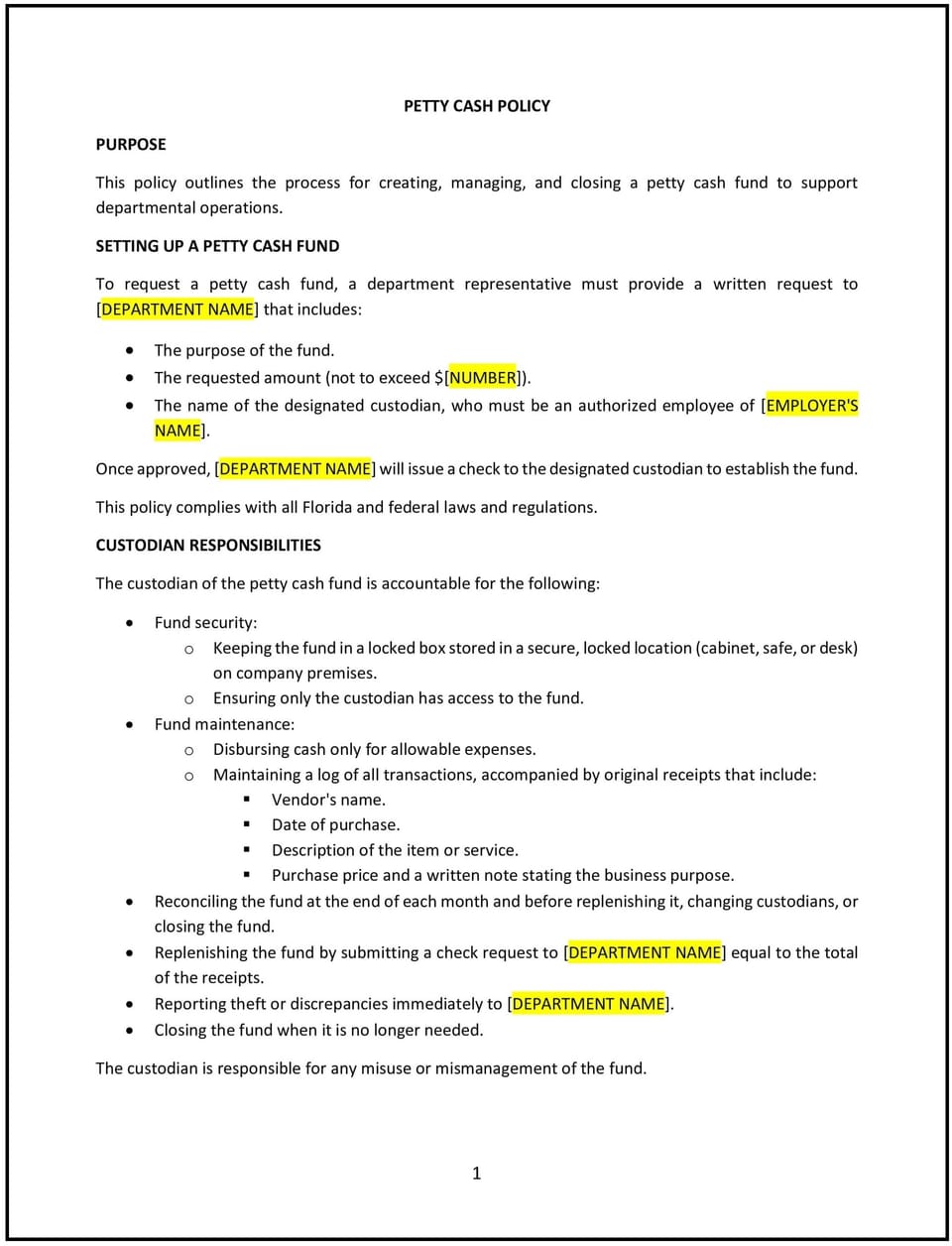Petty cash policy (Florida): Free template

Petty cash policy (Florida)
A petty cash policy helps Florida businesses establish guidelines for managing small cash transactions and maintaining accurate records. This policy outlines procedures for handling petty cash funds, reconciling balances, and ensuring accountability. It is designed to promote transparency, reduce risks, and provide clear expectations for managing petty cash in the workplace.
By implementing this policy, businesses in Florida can demonstrate their commitment to ethical practices, enhance operational efficiency, and align with the state’s focus on fostering a fair and transparent workplace.
How to use this petty cash policy (Florida)
- Define petty cash: Clearly specify what types of expenses qualify for petty cash, such as small purchases, postage, or minor office supplies.
- Establish fund allocation: Outline how much money will be allocated to the petty cash fund and who is responsible for managing it.
- Address reconciliation procedures: Explain how often the petty cash fund should be reconciled, including the process for verifying receipts and balances.
- Specify documentation requirements: Provide guidelines on the types of documentation required for petty cash transactions, such as receipts and log entries.
- Communicate the policy: Share the policy with employees during onboarding and through regular communications to ensure awareness and understanding.
- Monitor adherence: Regularly review how the policy is applied and address any concerns or discrepancies promptly.
- Update the policy: Periodically assess the policy to reflect changes in workplace dynamics, legal standards, or business needs.
Benefits of using this petty cash policy (Florida)
This policy offers several advantages for Florida businesses:
- Promotes transparency: Clear guidelines help ensure that all petty cash transactions are reported and reviewed.
- Reduces risks: Defined procedures minimize the likelihood of mismanagement, fraud, or reputational damage.
- Builds trust: Demonstrates the business’s commitment to ethical practices and accountability.
- Aligns with community values: Reflects Florida’s emphasis on fairness, transparency, and mutual respect in the workplace.
- Enhances reputation: A robust policy showcases the business’s dedication to ethical practices and operational integrity.
- Improves decision-making: Helps businesses anticipate potential risks and incorporate safeguards into petty cash management.
- Supports growth: A strong framework for managing petty cash fosters a culture of accountability and continuous improvement.
Tips for using this petty cash policy (Florida)
- Communicate clearly: Ensure employees understand the policy by providing written materials and discussing it during meetings or training sessions.
- Train employees: Educate staff on recognizing petty cash issues, understanding the policy, and following procedures.
- Use technology: Leverage tools like accounting software to track petty cash transactions, verify receipts, and monitor compliance.
- Stay informed: Keep up with changes in financial management trends, regulations, or best practices that may affect petty cash policies.
- Encourage feedback: Solicit input from employees to identify areas for improvement and ensure the policy meets their needs.
- Review periodically: Assess the policy’s effectiveness and make updates as needed to reflect changes in workplace dynamics or business goals.
Q: Why should Florida businesses adopt a petty cash policy?
A: Businesses should adopt this policy to promote transparency, reduce risks, and demonstrate their commitment to ethical practices regarding petty cash management.
Q: What types of expenses should be covered by petty cash?
A: Businesses should consider expenses such as small purchases, postage, minor office supplies, and other low-value items that are frequent and predictable.
Q: How should businesses handle petty cash reconciliations?
A: Businesses should reconcile the petty cash fund regularly, verifying receipts and ensuring that the total expenditures match the fund’s balance.
Q: Should businesses require documentation for petty cash transactions?
A: Businesses should require detailed documentation, such as receipts and log entries, for all petty cash transactions to ensure transparency and accountability.
Q: What should businesses do if a discrepancy is found in the petty cash fund?
A: Businesses should address discrepancies promptly by investigating the issue, taking corrective actions, and reinforcing the importance of compliance.
Q: How can businesses ensure fairness in managing petty cash?
A: Businesses should apply the policy consistently across all employees, ensuring that decisions are based on objective criteria and documented evidence.
Q: How often should businesses review the policy?
A: Businesses should review the policy annually or whenever there are significant changes in workplace dynamics, legal standards, or business operations.
This article contains general legal information and does not contain legal advice. Cobrief is not a law firm or a substitute for an attorney or law firm. The law is complex and changes often. For legal advice, please ask a lawyer.


